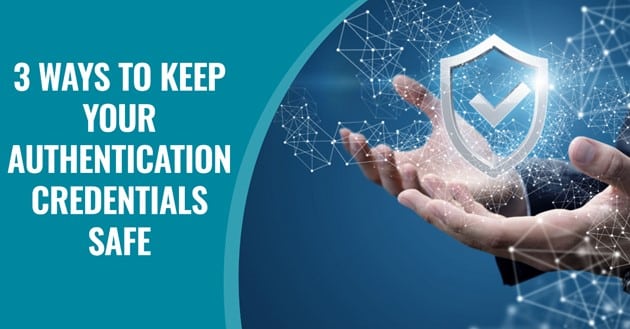3 Ways To Keep Your Authentication Credentials Safe
Securing Your Digital Identity: A Must in Today's World

Here are 3 Ways To Keep Your Authentication Credentials Safe: Ensuring the security of your authentication credentials is safe. In today’s life where a significant portion of personal and professional activities occur online, ensuring the security of our authentication credentials has become crucial. These credentials encompass usernames, passwords, and additional verification methods that act as the digital keys to unlock access to sensitive information, financial accounts, and valuable digital assets.
The concerns surrounding the security of authentication credentials have heightened with the increasing value of personal and corporate data. Data breaches, identity theft, and unauthorized access have emphasized the need for proactive security measures.
This article presents three vital strategies to boost the security of your authentication credentials and strengthen your digital defenses against potential threats. By implementing these strategies, you can significantly lower the risk of becoming a target of cyberattacks and safeguard your sensitive information.
Importance of Keeping Your Online Credentials Safe
1. Protection Against Identity Theft
Online credentials serve as virtual keys that unlock sensitive information, encompassing personal details and financial records. Identity thieves remain vigilant, ever in pursuit of opportunities to exploit weak or exposed credentials. If they obtain your login information, they can assume your identity across multiple platforms, gain access to your accounts, and potentially inflict irreparable damage.
Identity theft can have devastating consequences, from draining your bank accounts to unauthorized credit card purchases. In addition, cybercriminals can misuse your identity for fraudulent activities, damaging your reputation and leaving you to deal with the aftermath.
By ensuring the security of your authentication credentials, you establish a strong defense against identity theft, protecting your personal and financial well-being.
2. Prevention of Unauthorised Access
When someone gains unauthorized access to your online credentials, they can infiltrate various aspects of your digital life that you prefer to keep private. This may include compromising email accounts, breaching social media profiles, accessing cloud storage, and more.
Such unauthorized intrusion can result in embarrassing incidents, data leaks, or even potential blackmail if sensitive information gets exposed.

Compromised accounts can allow attackers to infiltrate your network or exploit your contacts. By ensuring the security of your online credentials, you reduce the risk of unauthorized access and maintain control over your digital presence.
3. Safeguarding Personal and Financial Data
During this era of widespread online transactions, safeguarding your financial data is paramount. With ill-intentioned individuals gaining access to your online banking and payment accounts, they can exploit the opportunity to drain your funds, initiate deceitful transactions, and severely disrupt your financial stability.
In addition, your online credentials can provide access to platforms where you store personal documents, such as tax returns, legal agreements, and medical records. The exposure of this private information can result in a violation of your privacy, legal complications, and emotional distress. By ensuring the security of your online credentials, you maintain control over your personal and financial data, protecting yourself from the wide-ranging consequences of data breaches and cyberattacks.
How to Keep Your Authentication Credentials Safe?
1. Strong and Unique Passwords
Crafting strong and unique passwords is essential to protect your accounts from unauthorized access. Weak passwords act as an invitation for hackers, leaving your digital life vulnerable.
Strengthen your security by creating passwords that combine upper and lower-case letters, numbers, and special characters. Avoid using easily guessable information such as birthdays, pet names, or commonly used words.
To enhance your online security, consider using a passphrase. A passphrase is a sequence of words or even a sentence that holds personal significance to you. Doing so makes it easier for you to remember while presenting more challenging obstacles for hackers to overcome. Furthermore, remember never reuse passwords across multiple accounts. While it may seem convenient and tempting, this practice exposes all your accounts to significant risks.
2. Two-Factor Authentication (2FA)
Two-factor authentication, or 2FA, enhances security measures beyond a mere password. By enabling 2FA, users must undergo an additional verification process when logging into their accounts. Typically, this involves utilizing a personal possession such as a smartphone.
Validation methods include receiving text messages, generating time-sensitive codes via authentication apps, or even using biometric data like fingerprints or facial recognition.
2FA greatly reduces the risk of unauthorised access. Even if a hacker gains your password, they would still require the second factor to gain entry. It is crucial to enable 2FA on all accounts that support it, particularly those containing sensitive information like financial or personal data. While no security measure is foolproof, 2FA adds a formidable barrier that can thwart many cyberattacks.
3. Regular Security Audits and Updates
Cyber threats and attack techniques are constantly evolving, making it crucial to review and update your security measures regularly. To safeguard against potential breaches, conducting routine security audits of your accounts is essential.
It helps ensure that there are no suspicious activities or unfamiliar devices accessing your sensitive information. Keep an eye on the features provided by most online platforms that allow you to monitor recent login attempts. It can be instrumental in identifying any unauthorized access promptly.
In addition, it is essential to update your devices and software consistently. Ongoing updates for operating systems, browsers, and applications are regularly released to address security vulnerabilities.
Optimize your settings to enable automatic updates whenever possible. This approach ensures you always have the latest security patches without manual intervention. Neglecting these updates exposes your devices to known exploits, posing potential risks.
Conclusion
In today’s digital age, it is imperative to prioritize the protection of your authentication credentials. To ensure your online security, you should adopt several vital practices.
First and foremost, create strong and unique passwords that cannot be easily guessed by potential attackers. Additionally, consider utilizing Two-Factor Authentication for an extra layer of protection. Regularly conducting security audits can further enhance your defenses against cyber threats.
Remember, the responsibility of safeguarding your digital identity lies in your hands. By implementing these strategies, you can navigate the virtual world with confidence and peace of mind.




